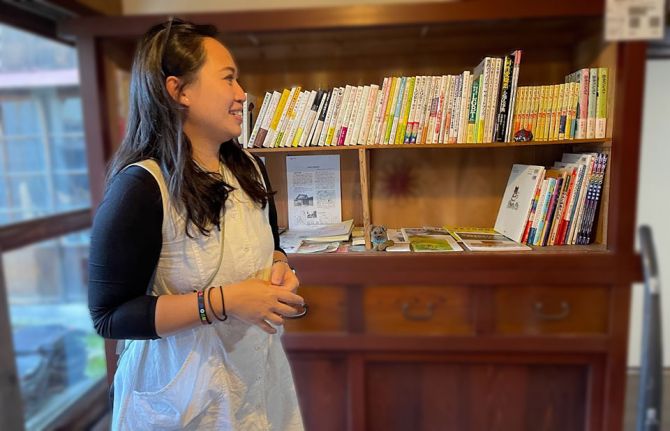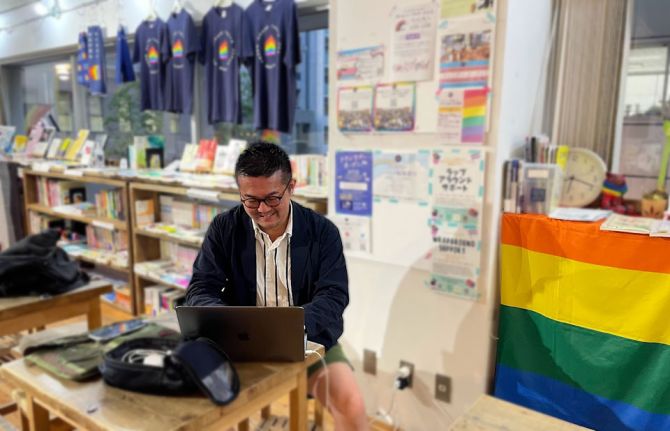



Feature Story
A rainbow of hope for LGBTQI+ people in rural Japan
17 May 2023
17 May 2023 17 May 2023For many years Mami taught at a state school in Kanazawa, Japan. When she started transitioning and dressing in a less masculine way, her colleagues and supervisors frowned upon it. Finally, she was fired.
As a transgender woman in a small, conservative city, Mami struggled to find another job and felt very isolated. “When a friend invited me to work at the Kanazawa Rainbow Pride community centre, I was happy to have a place where I was accepted,” she said.
Founded in 2022, the Kanazawa LGBTQI+ centre is in a 150-year-old tea house in what was the city’s former Samurai marketplace. The sliding panels allow for a variety of configurations depending on gatherings. Mami and her friend, Kennosuke Okumara, Head of the Kanazawa centre’s secretariat, were serving tea and coffee in the open bar kitchen to visitors.
“Before I worked in Tokyo but I returned to my native city,” Mr Okumara explained. “The problem was that there were and are no options for gay people here,” he said. Mr Okumara lives with HIV and laments the fact that HIV and LGBTQI+ issues are still taboo. “There is so little information, it is a shame and I am here to share my experience and share more awareness,” he said.
Mixing a green tea in a small cup with a bamboo whisk, Mr Okumara in his apron paused and looked at Mami. “This is a safe space for all here,” he said.
Diana Hoon, the centre’s co-President called the centre a beacon of hope. “We are like a lighthouse in a very conservative, patriarchal society,” she said. Showing off the many pamphlets and flyers varying from knowing one’s HIV status to the Pride parade in the city to books about coming out in the makeshift library, Ms Hoon said that the centre not only was attracting more people, they also had 10 volunteers helping out... many of whom are mothers.
"Our parent seminars about LGBTQI+ have had a lot of impact,” she said. “People share stories about their children and a connection is made.”
As a Singaporean living with another woman who is originally from Kanazawa, Ms Hoon feels like she is doing her part to provide a lifeline for people and push for more acceptance.
“Among our many priorities we do HIV awareness as well as advocate for gender neutral toilets, gender neutral school uniforms and most importantly marriage for all, which does not yet exist in Japan,” she said. She also hopes that within five years they can add a shelter to house LGBTQI+ people.
In her mind there have been incremental steps. “Transgender people have been more outspoken of late and we have LGBTQI+ champions among the community,” she said.
Such a role model is Gon Matsunaka, Founder and former President of the Pride House Tokyo consortium and the Director of the Marriage for All movement in Japan. A former advertising executive for one of Japan’s top firms, Dentsu, Mr Matsunaka hid his sexuality for decades. “For me there was no future in my rural hometown, so I left for Tokyo,” he said. He then studied in Australia, worked in Tokyo as well as New York City and ultimately left his firm.
He came out as gay in 2010 and fixated on providing a community centre in Tokyo. The Olympic Games seemed like a golden opportunity.
The COVID pandemic struck, putting a lot of projects on hold but Mr Matsunaka and his team did not give up.
“In May 2020, survey after survey revealed that LGBTQI+ youth felt unsafe at home or they had lost touch with people, this really motivated me,” he said. He had secured 15 sponsors for a temporary LGBTQI+ safe space during the Olympic and Paralympic Games, called Tokyo Pride House. With the postponing of the Games however, the centre was cancelled.
The team persuaded the sponsors to shift their funding and create a permanent space. Years after the Olympics, Tokyo Pride House still stands proud within walking distance of the popular queer-friendly Shinjuku area in Tokyo.
In Kanazawa, Mr Matsunaka had linked up with Ms Hoon to start a Pride parade in 2021. Out of that success came the idea of a community centre.
Mr Matsunaka is particularly proud that the prefecture (city district) contributed half the funds to the Kanazawa Nijinoma centre. The rest was a result of crowdfunding.
Beaming in the Tokyo Pride House surrounded by rainbow flags, he said, “I never dreamed of this and never imagined it could be possible especially in a small city like Kanazawa.”
In his mind, women have been key. “Women have 2nd rank to men especially in rural areas like Kanazawa, so they have been our greatest allies to change the patriarchal mentalities,” he said. “Mind you we have a lot more work ahead, but I only want to go forward not backwards."
On International Day Against Homophobia, Biphopia and Transphobia (IDAHOT), UNAIDS stands in solidarity with the LGBTQI+ community. We must unite and celebrate diversity; a society where everyone, no matter where they live or whom they love, is able to live in peace and security; a society where everyone can contribute to the health and well-being of their community.



